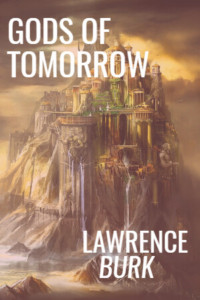Title: Gods of Tomorrow
Author: Lawrence Burk
Publisher: Book Art Press Solutions
ISBN: 9781952852312
Genre: Science-Fiction & Fantasy
Pages: 234
Reviewed by: Tara Mcnabb
Pacific Book Review
The supernatural and the ordinary collide with unexpected results in this compelling fantasy novel Gods of Tomorrow.
In a future world very different from our own, demigods are tasked with protecting humanity while existing among mortals. For decades their presence was accepted by mankind, and peace and prosperity were plentiful. But now, as the population begins to reach staggering proportions, the demigods find themselves stretched to the limit in their abilities to protect human beings. With so many demands and so few demigods to meet those demands, the reality of maintaining the peace starts to feel almost impossible. Not only that, but humanity itself is changing; the demigods are not held in such high esteem as they once were. Many people view them with suspicion and animosity, wary of their supernatural powers. But all that suddenly changes when the demigods are stripped of their powers and must learn to live amongst men. Will they be able to convince the people of their relevance in a time of chaos, or will they become obsolete forever?
Gods of Tomorrow is the final book in the Alien Within series. With four other books in the series, it would be wise to start from the beginning for those new to the storyline; Gods of Tomorrow is a culmination of everything that has come before. The dramatic shift from powerful demigod to ordinary being is a striking one, and it’s an interesting premise for the final book. But more than that, the loss of supernatural abilities is a metaphor for what happens when we are stripped down to our very essence, to what really matters. Because the demigods have egos and desires of their own, it successfully sets the stage for dramatic conflict as some struggle in vain to remain in control.
The plot has a modern setting which makes it suitable for young adult readers, and the inner emotional conflicts that feature prominently within the characters help to make them more relatable. The author’s writing style favors simple, straight-forward language instead of unnecessary embellishments that can distract from the story line. The struggle between good and evil is described with refreshing lucidity: “The lack of faith found many ways to get people to lash out at each other but for the grace of the good spirits, people usually reconciled their differences before it turned to action.” The idea of guardian angels has always had a strong appeal for many, and this series imbibes a new spin on such an iconic premise by combining elements of change and relevance into the story. The book’s greatest strength lies in its ability to question humanity’s modern disregard for spirituality, while contrasting that against the yearnings of the heart.
For those looking for a modern fantasy story with an intriguing spin on good vs evil, look no further than this series.


